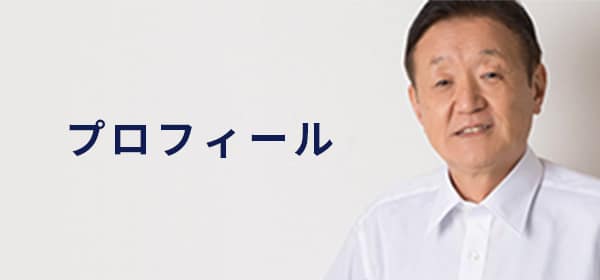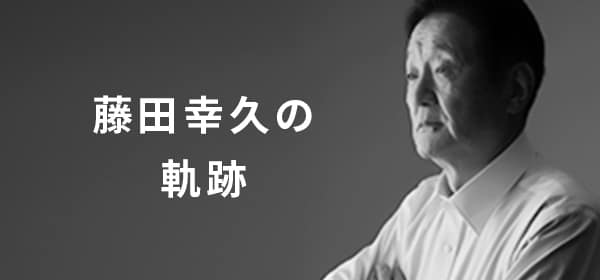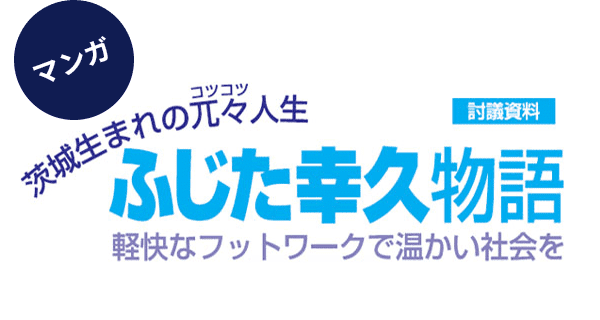藤田幸久とは
Profile
Yukihisa Fujita
Former Vice Minister of Finance
Former Member of the Diet, Japan's Parliament
Chairman, the International IC (Initiatives of Change) Association of Japan.
Visiting Professor, Gifu Women’s University
Expert Board Member, Peace and Security Center,
German Southeast Asian Center of Excellence for Public Policy and Good Governance (CPG)
E-mail: yukihisa@y-fujita.com
Website: https://y-fujita.com
Vice Minister of Finance
September 2011 to October 2012
- Served in the Cabinet of Prime Minister Yoshihiko Noda.
- In charge of the Budget Bureau, Finance Bureau, and the Bank of Japan.
House of Councillors
July 2007 to July 2019
- Elected twice to the Upper House of Japan's Parliament representing Ibaraki Prefecture (north of Tokyo).
- Chairman of the Special Committee on North Korean Abductions.
- Chairman of the Committee on Financial Affairs.
- Chairman of the Committee on Fundamental National Policies (question time).
- Since 2009, worked with MPs across party lines to help the Japanese Government to arrange an annual program to invite former American prisoners of war held by the Imperial Japanese military during the Second World War to visit Japan.
- Secretary General (current) and founding member of the Parliamentary group to support the World Conference for Religion and Peace (WCRP or RfP).
House of Representatives
October 1996 to June 2000
November 2003 to June 2005
- Elected twice to the Lower House of Japan's Parliament representing Tokyo.
- In 1996, established the Diet Member’s League for a Total Ban on Anti-Personnel Landmines and helped encourage then Foreign Minister Keizo Obuchi (later Prime Minister) to sign the 1997 Convention on the Prohibition of the Use, Stockpiling, Production and Transfer of Anti-Personnel Mines and on their Destruction (referred to as the Ottawa Convention or Anti-Personnel Mine Ban Treaty).
Democratic Party of Japan
- Shadow Foreign Minister and Director General for the International Department.
- Sent by the Democratic Party of Japan (DPJ) to help the victims of disaster: Indonesia and Sri Lanka (2004 Indian Ocean tsunami), Pakistan (2005 earthquake), and Haiti (2010 earthquake).
- Sent to Jordan in 2004 to help secure the release of five Japanese nationals held hostage in Iraq.
- Helped create a DPJ office to aid Afghanistan refugees in Kabul and Peshawar, Pakistan from January 2002 to June 2002.
- Started a DPJ office in Skopje, Macedonia to help Kosovo refugees from January 1999 to July 1999. This was the first overseas office for humanitarian purposes established by a Japanese political party.
Other Achievements
Building a More Moral World
- Since March 2022, the Chairman of the International IC (Initiatives of Change) Association of Japan. The IC was known as MRA (Moral Re-Armament) before 2001.
In 1984, became an Executive Director of the International MRA Association of Japan. - Have attended the National Prayer Breakfast (NPB) in Washington DC four times until 2018 and NPB Japanese chapter meetings.
- In 1986, when there were signs that Europe, Japan and the U.S. might be on the verge of a trade war, helped launch the Caux Round Table (CRT) for Moral Capitalism. Participants included leaders in business from Europe, the U.S., and Japan: Frits Philips, former CEO of Philips Electronics (the Netherlands); Olivier Giscard d'Estaing, Vice Chairman of the INSEAD business school (France); Neville Cooper, Chairman of the Top Management Partnership (U.K.), Owen Butler, Chairman of Procter & Gamble (U.S.), Winston Wallin(Chairman, Medtronic (U.S.); Ryuzaburo Kaku, President of Canon (Japan); Toshihiko Yamashita, former President of the Panasonic (Japan). In 1994, the CRT published a set of Principles for Business, which London’s Financial Times wrote, "is thought to be the first time a document of this kind has attracted influential supporters from Europe, Japan and U. S.”
- After graduating from university, joined a MRA international goodwill mission “Song of Asia” together with 50 young people from 15 countries in Asia and the Pacific. As a member of this group, spent two years visiting 14 countries in Europe, North America, and Oceania, staying with more than 100 families.
- Have subsequently visited 52 countries and stayed in the homes of nearly 200 families.
Conflict Resolution, Democracy Support & Refugee Relief
- Established the Diet member’s group to support the World Conference for Religion and Peace (WCRP, or Religion for Peace). It helped host a workshop on reconciliation between Buddhists and Muslims in south Thailand in 2013, helped host a confidence-building workshop amongst Islam leaders of various sects from the Middle East countries after the tension between Saudi Arabia and Iran increased in Tokyo in 2016, helped invite religious leaders from all religions of Myanmar to a trust-building meeting in Tokyo in 2016. The WCRP hosted a Tokyo Peace Round Table,” Beyond war to reconciliation” in September 2022 which religious leaders from Ukraine, Russia, Turkey, Ethiopia, Syria, Western Europe and America attended. helped organize it and also hosted a private meeting between a Ukraine religious leader and a Russian religious leader.
- In 2018 played a role in the Japanese Government's decision not to recognize the Cambodian general election by not sending an official election-monitoring team. For decades, have helped Cambodian democracy advocates such as main opposition party leader Sam Rainsy, Prime Minister Son Sann and Privy Council member Son Soubert.
- In 2002, helped host Enlightened Post Cold War Initiative for Peace and Democracy: Enhancing the Role of Parliament and NGOs, a symposium in Tokyo. Participants included the Chairman and President of both Houses of the Japanese Parliament; representatives from National Endowment for Democracy (NED), National Democratic Institute for International Affairs (NDI) and International Republican Institute (IRI) (U.S.); Friedrich Ebert Stiftung (Germany), Jean-Jaures Foundation (France), International IDEA (Sweden), Institute for Multi-Party Democracy (The Netherland) and the Center for Democratic Organizations (Australia).
- In 1996, initiated An Agenda for Reconciliation, a conference held at the MRA conference centre at Caux, Switzerland to find reconciliation and bring an end to conflicts across the world that have continued in various names till now. (Caux was where 3,113 German and 1,983 French citizens met between 1946 and 1950 to seek reconciliation, including German Chancellor Konrad Adenauer and French Foreign Minister Robert Schuman.)
- Worked in confidence-building efforts to bring various Cambodian factions together and hosted international conferences for national reconciliation in Cambodia in 1991 and 1992.
- In 1979, became a Director of the Association for Aid and Relief (AAR), the first Japanese NGO to help refugees. In 1980, launched projects to help Cambodian refugees and citizens at the Thai-Cambodian border and later inside Cambodia; some of those projects continue to the present day. In 1984, started projects to help refugees in Zambia and Zimbabwe; the Zambia projects continued until 2004. The AAR is now helping those Ukraine refugees and evacuees in Western Ukraine, Moldova and Japan.
Helping those Japanese living abroad
- As a former Chairman of a Diet league to support the Overseas Online Voting System,
- and in cooperation with those Japanese in America, trying to help the Japanese Government to start it. Foreign Minister Yoshimasa Hayashi and Minister Taro Kohno in charge of online voting have expressed their support.
- Helping to change Article 11 of Japan's nationality law which stipulates that "A Japanese national shall lose Japanese nationality when he or she acquires a foreign nationality by his or her own choice." This means a Japanese legally stopped being Japanese when he or she became a U.S. citizen. Because of Covid, this rule has made those overseas Japanese who want to return to Japan difficult to receive medical insurance and social benefits.
To help with these above, wrote articles for “Weekly New York Life”, a Japanese language weekly in New York 9 times in 2022.
- 海外日本人サポート 在米邦人と国政とを結ぶ
- 海外日本人サポート 国会議員7人ネット投票要望質疑
- 最高裁、在外邦人の国民審査投票を認める | 週刊NY生活ウェブ版 (nyseikatsu.com)
- ネット投票に必要な政府の信頼回復 | 週刊NY生活ウェブ版 (nyseikatsu.com)
- 海外日本人サポート 最高裁判事の孫の日本国籍剥奪
- 海外日本人サポート 日本国籍自動剥奪違憲訴訟
- 海外日本人サポート 河野太郎大臣、在外ネット投票に意欲
- 海外邦人のマイナンバー 取得は2024年5月
- 前進の一年 | 週刊NY生活ウェブ版 (nyseikatsu.com)
- 在外投票ネット以外に他策なし在外投票 | 週刊NY生活ウェブ版 (nyseikatsu.com)
- 国籍法違憲訴訟は1勝1敗 | 週刊NY生活ウェブ版 (nyseikatsu.com)
- 旅券更新のネット化がネット投票の後押し | 週刊NY生活ウェブ版 (nyseikatsu.com)
- 米国籍と永住権の大差を無視する国籍法 | 週刊NY生活ウェブ版 (nyseikatsu.com)
- 在外はネット投票、国内は郵便投票が安全弁 | 週刊NY生活ウェブ版 (nyseikatsu.com)
- マイナンバーカードは海外日本人の恩恵が先行 | 週刊NY生活ウェブ版 (nyseikatsu.com)
- 日本は民主主義国か? 国籍法訴訟秋の陣 | 週刊NY生活ウェブ版 (nyseikatsu.com)
- 原発水海洋放出、スリーマイルと福島の違い | 週刊NY生活ウェブ版 (nyseikatsu.com)
Education
- Graduated from the Faculty of Philosophy, B.A. Keio University, 1975
Taught Japanese politics & economy, conflict resolution, and NGO activities at Yokohama National University, Seigakuin University, and Gifu Women’s University as a lecturer or visiting professor.
Publications
Book:
- The Politician Who Didn't Want to Become a Politician (「政治家になりたくなかった政治家」), published by The Japan Times, 2003.
Translations:
- Translated (1981) Victor Sparre's The Flame in the Darkness: The Russian Human Rights Struggle, as I Have Seen It, 「ソ連の反体制派たち」about how the author helped Soviet dissidents Alexandr Solzhenitsyn and Andrei Sakharov escape to the West. Published by the Simul Press, 1981.
- Translated (1990) Basil Entwistle's Japan’s Decisive Decade, 「日本の進路を決めた10年」about how the author helped Japanese leaders in politics, industry, labor, education and media to reconcile with her neighbors and return to the international community after the Second World War. Revised edition published by The Japan Times, 2016.
Articles in English:
- 221130 Asia-in-Review-Don’t forget Myanmar and Cambodia! Asia in Review November 30, 2022
- What Abe Should Tell Congress, The Japan Times, April 17, 2015.
- Aso Mining’s Indelible Past: Prime Minister Aso Should Seek Reconciliation with Former POWs, The Asia Pacific Journal/Japan Focus, April 15, 2009.
- Kishi’s Diplomacy Overdue, The Japan Times, Aug 18, 2006.
- Prime Minister Kishi’s Diplomacy of Reconciliation, Japan Echo, Aug 1, 2006.
- Japan Needs a Political Settlement on Its Past, Asahi/International Herald Tribune, Oct 23, 2001.
Born in Hitachi, Ibaraki Prefecture, Japan in 1950.
Updated: September 2023










